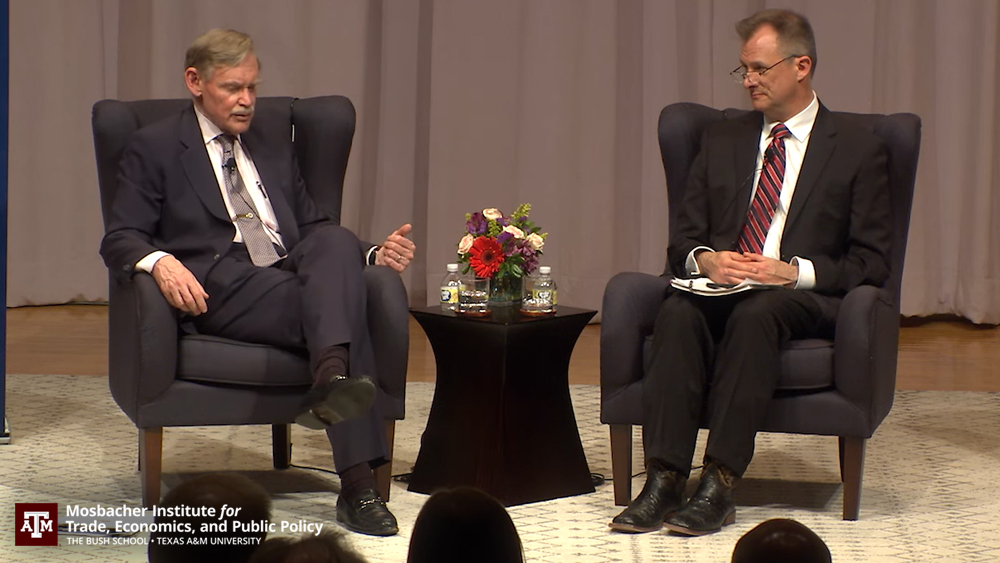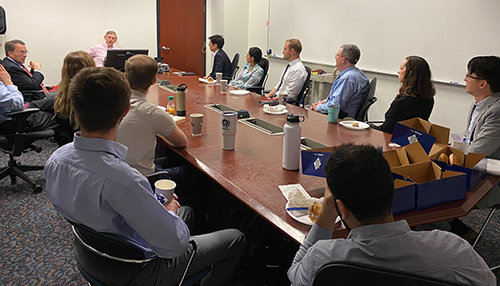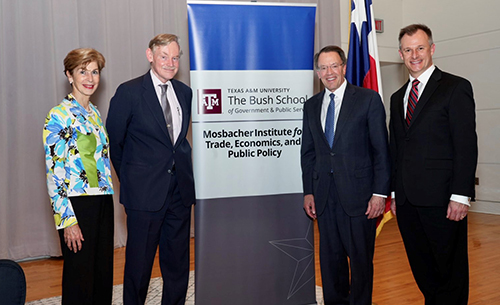
On April 12, 2022, the Mosbacher Institute hosted the 2022 ConocoPhillips White House Lecture, featuring Ambassador Robert B. Zoellick, the 11th President of the World Bank Group and the 13th U.S. Trade Representative, to discuss the critical role of U.S. economic diplomacy. The ConocoPhillips White House Lecture Series brings to public attention the various offices of the White House and Executive Branch that provide policy, administrative, and overall support to the President.
Zoellick spoke about the ways in which economic diplomacy helps build American influence and power—not only to help the United States capitalize on its economic attraction, but also to help connect the U.S. private sector’s dynamism and innovation with the world, build coalitions, and assist U.S. allies and partners. At the same time, he argued, it also strengthens the U.S. economy, by making it more open, competitive, and adaptive.

To illustrate the importance of economic diplomacy for the United States, Zoellick talked about three historical examples that show that economic diplomacy has always been a pillar of U.S. foreign policy. Zoellick argued that economic diplomacy was a major reason for the founding fathers’ neutral foreign policy, helped shape the post-World War II global system, and helped strengthen the diplomatic ties between the United States and its closest neighbors, particularly Canada and Mexico, through trade agreements like NAFTA and USMCA.
Having talked about the historic role of economic diplomacy, Zoellick added that economic diplomacy still has important implications for U.S. economic statecraft today. U.S. financial credit; the status of the U.S. Dollar as a global currency; and the influence of U.S. trade and investment policies, which create mutual benefits for both the United States and its allies, are all major pillars of American foreign policy. In addition to providing carrots that build and strength American alliances, Zoellick asserted that U.S. economic diplomacy also allows for effectively applying sticks through U.S. sanctions, which in turn depend on U.S. leadership of a committed international coalition.

Following his speech, Zoellick sat down with Raymond Robertson, the Director of the Mosbacher Institute, for an on-stage discussion of various issues currently facing America. The discussion covered domestic support among the American public for open and international trade, the challenges of economically integrating the Americas, and the lessons learned from the Ukraine conflict.
While in College Station, Zoellick also met with Bush School faculty and four classes. Ambassador Larry Napper’s Diplomatic Negotiations students, who have been reading Zoellick’s book America in the World: A History of U.S. Diplomacy and Foreign Policy as one of their assigned texts, were delighted to get their books all signed by the author.
Zoellick’s lecture on U.S. Economic Diplomacy can be viewed on the Bush School YouTube channel.

